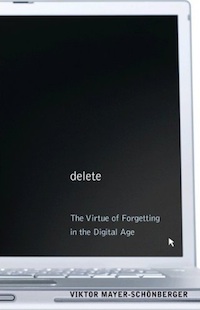
When Google launched Gmail back in 2004, the company was explicit about the goal: never delete another message. Archiving would be the default, and search would save us from the tyranny of folders and filing.
"Built on Google search technology, Gmail enables people to quickly search every email they've ever sent or received," the announcement promised. In case you didn't get it the first time, "Google believes people should be able to hold onto their mail forever." And, finally, "Gmail is built on the idea that users should never have to file or delete a message, or struggle to find an email they've sent or received."
Cheap storage has been a boon in many ways, but can it also be a nightmare? That's the premise of a recent book by professor Viktor Mayer-Schönberger called Delete: The Virtue of Forgetting in the Digital Age. The book's bottom line is a simple one: technology has now made "remembering" the default approach to information, and in doing so, threatens to make "forgetfulness" obsolete.
Welcome to the data panopticon.
The horrors of perfect memory
| Delete |
|---|
| Princeton UP |
| 199 pages |
| $24.95 |
Truly perfect memory would be a curse, one illustrated for Mayer-Schönberger by the Jorge Luis Borges short story "Funes the Memorious" (called "Funes, His Memory" in the most recent English translation by Andrew Hurley, which I highly recommend picking up).
In the story, the narrator meets Funes, the man who cannot forget. "The truth was, Funes remembered not only every leaf of every tree in every patch of forest, but every time he had perceived or imagined that leaf. He resolved to reduce every one of his past days to some 70,000 recollections, which he would then define by numbers. Two considerations dissuaded them: the realization that the task was interminable, and the realization that it was pointless. He saw that by the time he died he would still not have finished classifying all the memories of his childhood."
Total recall would be a curse not only for the one doomed to have it, but for all those who come in contact with him. When every action will be marked indelibly on the unfolding scroll of time, acting at all becomes difficult. Every gesture, every word demands to be epic. As the narrator notes at the end of the story about Funes, "I was struck by the thought that every word I spoke, every expression of my face or motion of my hand would endure in his implacable memory; I was rendered clumsy by the fear of making pointless gestures."
That such concerns are not merely the work of philosophical fantasists is shown by the case of a 41-year old California woman named A.J., who has a brain problem that seems to give her similar powers of recall. "Since she was 11," writes Mayer-Schönberger, "she remembers practically every day—not in the sense of a day that passed, but in astonishing, agonizing detail. She remembers what exactly she had for breakfast three decades ago; she recalls who called her and when, and what happens in each episode of the television show she watched—in the 1980s... Instead of bestowing AJ with a superb facility, her memory repeatedly restricts her ability to decide, and to move on."
Selective forgetfulness is a boon to humanity; it keeps us from drowning in our own recorded data. It allows us to sift and sort, then to think at a higher level of abstraction instead of wallowing in detail. But while forgetting has been the human default since "humans" first appeared, Mayer-Schönberger argues that something has been flipped over the last 40 years. Thanks to machines, remembering is now the default.
The shift has been driven by four factors: digitization, cheap storage, easy retrieval, and global reach. The end result is things like Gmail—and the story of Andrew Feldmar.
Feldmar is a Canadian psychotherapist who crossed into the US to pick up a friend at the Seattle airport in 2006. At the crossing, a border guard decided to Google Feldmar's name for some reason. He came across a 2001 article written by Feldmar in which the man referenced his own use of LSD—back in the 1960s. Feldmar was then denied entry to the US.

"Do we want a future that is forever unforgiving because it is unforgetting?" asks Mayer-Schönberger. "If we had to worry that any information about us would be remembered for longer than we live, would we still express our views on matters of trivial gossip, share personal experiences, make various political comments, or would we self-censor? The chilling effect of perfect memory alters our behavior."
This is especially true of the Web, which has the amazing property of making it quite difficult to really remove or limit the reach of information. If, in a moment of pique, a young person posts an unfortunate political rant to a personal blog, then later changes her views, the article will be cached and archived by dozens of sites. It may have been quoted or reposted elsewhere, or commented upon by other bloggers. Is it just for a some company 20 years later to use the post when making a hiring decision?
What Mayer-Schönberger comes close to, with his language about "forgiveness" and "second chances," is an almost theological point. What humans, so changeable and so error-prone, truly need is a machinery that works with human weakness. Call it a machinery of grace.
Has your data expired?
Technology has always been used as a memory aid, of course, but in past millenia, scratching on a clay tablet, writing with a fountain pen, and snapping a digital photo have all required an act of will. Humans had to choose what they would remember.
Now, in an age of ever-cheaper storage, the data committed to machine memory requires an act of will to delete. Storage is now so cheap, in fact, that it requires more effort to cull an e-mail inbox or photo gallery than it does to simply hold on to everything.
To get back to a default state of forgetfulness, Mayer-Schönberger offers an intriguing proposal: find simple ways to give data an expiration date. This can be done as file metadata, and it has the virtue of making us ponder, for a split second, how long information should live. When I snap pictures of my desktop using a tool like Skitch and show them to other Ars staffers, the files are ephemeral; used for a moment or two, they will never be wanted again. But because Skitch offers no way for me to express a preference that my files be deleted after (say) six months, they remain perpetually on the company's servers. And because deleting them myself takes effort, I don't do it.
But if tools like Skitch and Gmail and Facebook let us tag data with expiration dates (these could always be changed later, of course), then they would "prompt users to reflect, at least for a moment, about the lifespan of the information they intend to store." They "remind us that the value of information is not timeless" and that "good information is preferable to copious information."
Delete is a short book with a basic concept that's simple to grasp. If the topic appeals to you, the book is worth reading for its extended discussions of memory and solutions that won't really work (like "digital abstinence"). Those looking for the shorter version would do well to consult Mayer-Schönberger's 2007 paper that laid the groundwork for the book.
reader comments
46